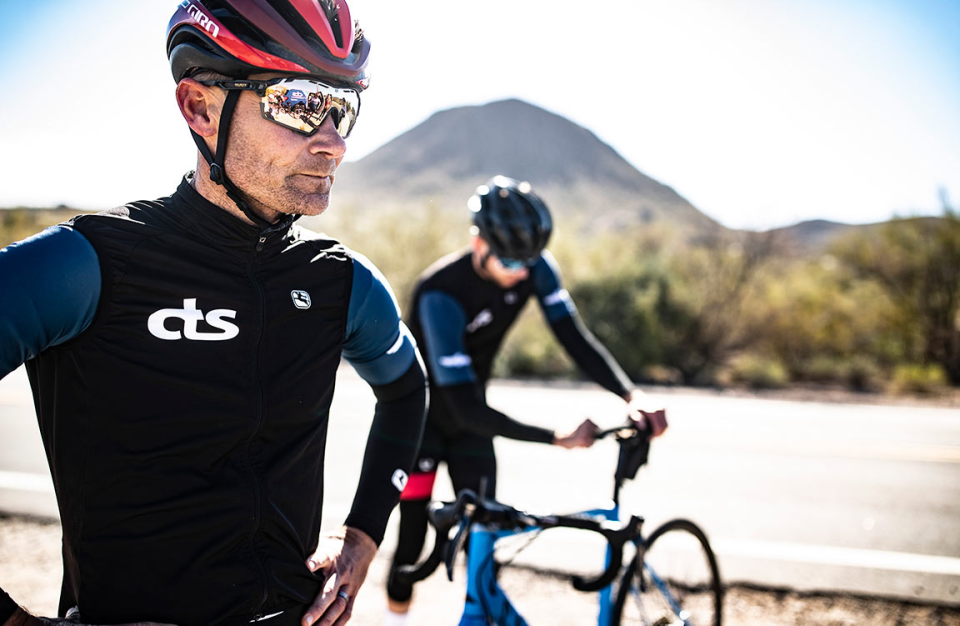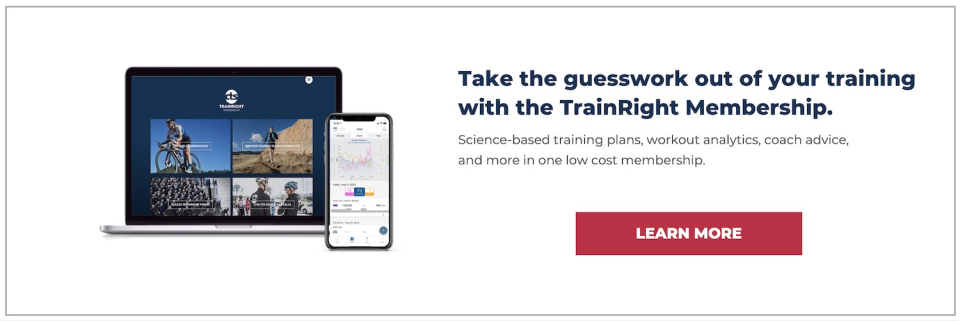How to Be a Better Cyclist in 6 Weeks
As the number of vaccinated people steadily rises, cycling events are proudly announcing their return and riders are eagerly signing up. Getting back to races, gran fondos, camps, tours and group rides is wonderful, but it also means ramping up or bringing greater focus to your cycling training
by Chris Carmichael, Founder and Head Coach of CTS
So, you’ve signed up for a goal event or planned a long-delayed cycling getaway… here’s how to become a stronger, faster, and better cyclist in 6 weeks.

Although I’m presenting this as a progression over six weeks, you can certainly incorporate aspects of each throughout the process. You don’t need to wait until Week 4 to ride with friends or go to the group ride to practice cycling skills. Aspects of recovery will be important from the beginning and throughout. They’re presented by week because it’s difficult to increase focus on everything at once, and this is a good order in which give these individual aspects of preparation more attention.
Week 1: Identify training goal and create/get a plan
Many cyclists used the last year of ‘work from home’, event cancellations, and travel restrictions to increase their monthly and annual training volume. That’s great, and as coaches we’re seeing it evidenced in TrainingPeaks data by year-over-year increases in Chronic Training Load (CTL). Where an athlete might typically start March with a CTL of 35, this March it was 50. That gives the athlete a higher starting point to build better-than-ever summer fitness.
What we’re also seeing, however, is that cyclists have more generalized fitness and less event-specific fitness. They have deeper aerobic foundations, good power at lactate threshold and often the ability to sustain lactate threshold power longer than before. These are all good things, but now it’s time to add in event-specific work like high-speed sprinting, accelerating from low speeds, repeated high-power efforts with limited recovery (think criteriums, cross-country and short track MTB), and VO2 max work.
Identify the demands of the event or goal you’re preparing for, the kind of training required to better meet those demands, and the schedule needed to accomplish it. Six weeks is not a lot of time to experience transformative improvements in fitness, but it is enough time to make adjustments that can make a difference for your goal event. Training plans are available in the Trainright Membership, along with access to coaches and community to help you choose and adjust a plan. You can try it for free for 7 days, or get started with a personal coach instead.
Week 2: Focus on Fueling
Once you have a plan in place, you have to ensure your fueling choices can support your training. A six-week timeframe leading up to a goal event is not the time to create a calorie deficit and focus on weight loss. Instead, focus on supporting training workload with adequate calories. Overall energy intake is more important than the precision of your macronutrient (carbohydrate, protein, fat) composition, or even which macronutrient strategy you choose (carb-heavy vs. high protein vs. high fat, etc.).
On the bike, focus on a nutrition strategy that will work in your event. For long gran fondos and gravel race, marathon MTB, and high-mileage multiday tours it may be helpful to train your gut to consume more carbohydrate per hour (aiming for the upper end of the 60-90g/hr). For short and fast events like criteriums, shorter cross-country MTB, and even some shorter road races, there are fewer opportunities to eat, but thankfully less need to eat because of the short duration. For these events, you’ll want to practice nutrition strategies that optimize pre-event fueling and during-event hydration replenishment.
Week 3: Recovery Focus
Recovery between workouts is going to be important throughout this six-week process, and throughout any period of training. The reason I’m calling it out in week three is because the changes you’ve potentially made to training (more weekly hours, higher weekly training stress, more intervals) will be catching up to you about now. If you’re feeling the effect of the stress, that’s a good impetus to focus on optimizing recovery. Get serious about sleep by optimizing your environment, planning for more sleep hours, and scheduling naps. Take a look at your post-workout nutrition. If your training intensity and frequency have increased, the importance of a carbohydrate- and protein-rich meal within about an hour after a workout increases. Are you actually consuming 1.4-1.8 grams of protein per kilogram of bodyweight per day? It’s often more protein than people think it is.
FREE 14 DAY TRIAL! USE CODE: TRM14GFG
Week 4: Skills Practice
I was so happy to get back to holding cycling training camps with moderate-sized groups, but even after 50 years of cycling experience I noticed my group riding skills were a little rusty for the first few days. The stakes get even higher if you are re-entering high-speed, close-quarters competitions like criteriums, road races, and MTB races. Please don’t make a criterium your first group cycling experience after a year of riding solo and indoors. Go to the local group ride, if they’ve started back up, or get together with a safe-sized group of friends and reacquaint yourself with riding in a pack and paceline.
If you got into cycling more recently and have been training on your own for some or all of the past year, bike shop and cycling club rides can be a good starting point for learning to ride with a group. A cycling coach can be a good resource for skills training. It’s a big part of CTS cycling camps and many of our coaches offer skill lessons for one-on-one or small group settings, too.
Week 5: Mental Preparation
While developing mental skills is important year-round, a couple of weeks before a big event or challenge is often when self-doubt comes to the surface. Have you done enough? Are you going to be ready? Can I do it? The truth is, with 10-14 days before an event, you’re as physically prepared as you’re going to get. Instead of worrying about whether it’s enough, look back over all you’ve done for training and preparation throughout the last several months (not just the past few weeks) to build confidence that you have done the work. Was it perfect? Probably not. Could you have done more? Perhaps. Regardless, you’ve done a lot, it’s gotten you here, and it’s going to see you through to the completion of your event.
This is also a good time to establish or update process and outcome goals pertaining to your goal event. What will success look like for you on that day? What decisions or mindset will be conducive to success, and what thoughts and emotions do you need redirect so they don’t derail you? Mentally rehearse your responses to adversity. What are you going to do when things go wrong?
Week 6: REST
The week leading into an event is about not screwing it all up. You want to back off your training stress by reducing volume (hours) but retaining intensity (intervals). You want to maintain the routine of riding (frequency) rather than complete rest all week. If you’re traveling to an event, take steps to preserve sleep quality and avoid losing sleep hours if possible. And try not to pack a week’s worth of work into two days so you can go away for the weekend. Remember, to the body stress is stress.
Even though you’re reducing your training workload in order to be fresh for your event, maintain your normal dietary habits and don’t dramatically lower calorie intake because you’re not riding as much. Food is recovery fuel as well as energy for action. Eat this week to feel great on the day of your event. For a guide to pre-race or pre-event breakfasts, read this article.
Whether you’re getting back into the swing of things or getting ready for your first cycling event, there is a lot you can get done in six weeks. As I mentioned a few times above, it’s not enough time to completely transform your athletic performance, but it’s plenty of time to make meaningful and noticeable improvements in your speed, endurance, comfort level, and confidence.
For more information, please visit: https://trainright.com/better-cyclist-in-6-weeks/

